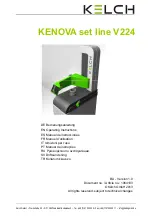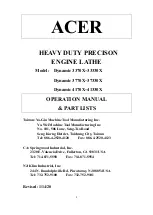
2-156
詳細説明
MACHINE OPERATIONS
7-20
G66
マクロモーダル呼出し(移動指令呼出し)、
G66.1
マクロモーダル呼出し(毎ブロック呼出し)、
G67
マクロモーダル呼出しキャンセル
G66 Macro Modal Call (Every Axis Travel Command),
G66.1 Macro Modal Call (Every Block), G67 Macro Modal Call Cancel
<
G66
>
G66
を指令してから
G67
でキャンセルするまでの
間、軸移動指令のブロックを実行する毎にマクロ呼
出しおよびサブプログラム呼出しを行います。
<
G66.1
>
NC
指令ブロック毎に無条件に指定されたマクロが
呼び出されます。各ブロックの指令は、アドレス
O
(プログラム番号)
、アドレス
N
(シーケンス番号)
および
G
コード以外はすべて実行されず引数になり
ます。
ただし、
G
コードは
G66.1
指令のブロックでは引数
とならず、次のブロック以降では最後に指定されて
いるもののみ引数となります。
つまり、
NC
指令のブロックはすべて、アドレス
O
(プログラム番号)
、アドレス
N
(シーケンス番号)
がある場合はその次、ない場合はブロックの先頭に
G65
が指令されているのと同じになります。
<G66>
Once G66 (macro modal call) is specified, a macro program or
a subprogram is called every time a block containing a travel
command is executed. This continues until G67 is specified to
cancel the modal macro call.
<G66.1>
In this mode, the specified macro is unconditionally called for
each NC command block. All the data other than address O
(program number), address N (sequence number), and G
codes that are specified in each block is not executed and is
used as arguments.
The G code in the block in which G66.1 is specified is not used
as an argument. Only the last G code specified in subsequent
blocks is used as an argument.
In other words, the situation is the same as if all blocks con-
taining NC commands have a G65 command; either at the
beginning of the block or, if one of these is present, following
the address O (program number) or address N (sequence
number).
G00 W#1; . . . . . . . . . . . . . . . . . . . . . . . . . . . . . .
穴加工開始点まで戻る
Returns the tool to the drilling start
point.
IF [#1 GE #23] GOTO 9; . . . . . . . . . . . . . . . . . . .
終了チェック
Checks whether drilling is
completed.
#2=#1; . . . . . . . . . . . . . . . . . . . . . . . . . . . . . . . . .
今回の深さを記憶する
Stores the depth of the current
hole.
N9 M99;
. . . . . . . . . . . . . . . . . . . . . . . . . . . . . . . .
マクロ呼出しプログラムへ戻
る
Returns to the program that called
the macro program.
N8 #3000=1 (NO Z OR U COMMAND); . . . . . . .
アラームを出す
Issues an alarm.
マクロ文については、制御装置メーカーの
取扱説明書
For details on macro statements, refer to the
instruction manual supplied by the NC manufac-
turer.
1.
G66
のブロックではマクロ呼出しを行い
ません。ただしローカル変数(引数)は
設定されます。
2.
補正機能など軸移動指令のないブロック
ではマクロ呼出しは行いません。
3.
ローカル変数(引数)は、
G66
のブロッ
クのみで設定されます。モーダル呼出し
の都度には設定されません。
1.
G66.1
のブロックでも呼び出しが行われ
ます。
2.
G66.1
のブロックの次のブロック以降で、
呼び出しが行われるブロックについて
(
G66.1
のブロックは含みません)
•
新たに
G, P, L
も引数となります。そ
の対応は
G:#10, L:#12, P:#16
です。
ただし、そのデータは通常
NC
指令
としての入力フォーマットの制限を
受けます。
例えば
";G1000. P0.12 L
−
4"
とは指
令できません。
•
G
コードが複数あった場合は最後の
もののみ引数になります。アドレス
O
(プログラム番号)、アドレス
N
(シーケンス番号)および
00
グルー
プ以外の
G
コードは、モーダル情報
として次ブロック以降に受け継がれ
ます。
1.
In a G66 block, no macro program is called.
Local variables (arguments) are set, however.
2.
No macro program is called in a block containing
commands for compensation functions but no
travel commands.
3.
The local variables (arguments) are set only in
the block specifying the G66 command. Note that
local variables are not set each time a modal call
is performed.
1.
In the block containing G66.1, a macro program is
called.
2.
The block that follows the one containing G66.1
and performs a macro program call (not including
the blocks containing G66.1)
•
Addresses G, P and L can also be used as
arguments. Address G corresponds to #10,
address L to #12, and address P to #16.
However, the restrictions on the input format
that apply to normal NC commands apply to
the data. For example, ";G1000. P0.12 L
−
4"
cannot be specified.
•
When multiple G codes are specified, only
the last G code is used as an argument. An
address O (program number), address N
(sequence number), and G codes not in
group 00 are passed to the next and
subsequent blocks as modal data.
Summary of Contents for MSX-850
Page 54: ...1 CHAPTER 1 BASIC OVERVIEW...
Page 170: ...2 CHAPTER 2 MACHINE OPERATIONS...









































